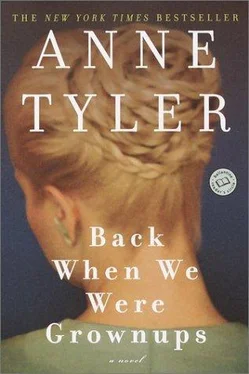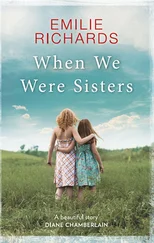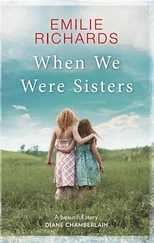Peter set the scorepad aside. “He could enjoy the party while it was happening, though,” he said. “Even if he did forget it later.”
“Yes, well…” She thought that over. “I guess I want points,” she told him. And then, when she saw his puzzled glance toward the game board: “Points for giving the party, I mean. I want him to credit me afterwards for doing it.”
He said, “Oh,” and went back to his rack of tiles.
“As for the cake,” she said, “I think botched cakes are a Davitch tradition. You should have seen my wedding cake! Mother Davitch didn’t bake it long enough and it was all soupy in the middle. The bride figurine on top fell into this sort of sinkhole, waist deep.”
Peter moved a letter from the middle of his rack to the end. A Z, she couldn’t help seeing. The lucky devil.
The bride had been ivory plastic, she recalled, with a pinpoint-sized dot of red lipstick and two little beady brown eyes. A matte black, scallop-edged hairdo had been painted onto her head. And the groom had been blue-eyed and blond — nothing at all like Joe.
The telephone rang. She reached for the receiver. “Hello,” she said.
“Ah, may I speak to Rebecca, please.”
She grew extremely still.
The furred voice, the Church Valley accent. The leisurely, drawn-out vowels, with I sounding not much different from Ah .
“This is Rebecca,” she said.
“Um, Rebecca, this is Will Allenby.”
“Will! How did you find out my number?”
“I looked at my Caller ID.”
That Will had Caller ID was a shock. It seemed she had been picturing him still living in the sixties.
“You hung up on me so fast,” he was saying. “Thank goodness for modern inventions, I guess.”
What did he want, anyhow? Why had he called her back?
It made things all the eerier that he said, at that very moment, “So. What did you call me for?”
“Oh, I…” She smoothed her skirt across her lap with her free hand. “I happened to be at home,” she said, “home in Church Valley, I mean, and Mother and I got to talking about old times and I don’t know, I just all at once thought, I wonder where Will ever got to!”
“Not so very far, as you can see,” he said. He gave a short laugh. “I’m right here where you left me.” Then he hastened to say, “Where we went to college, that is. Well, I haven’t been here the whole time. I did go away for my doctorate. But now I teach at Macadam.”
“That’s wonderful, Will.”
“In fact, I’m head of my department.”
“Congratulations.”
“Yes, I can’t complain. Can’t complain at all. Really I’ve done very well. Been very fortunate.”
“I’m glad to hear it,” she said.
“Last year they nearly made me a dean, except they decided in the end that they ought to bring in an outsider.”
“Isn’t that nice,” she said. “And are you… do you… I mean, I suppose you must be married, and all.”
“Well, I used to be.”
“Oh.”
“I married an ex-student of mine. An English major; beautiful girl. She was once even offered a modeling job, although of course she didn’t accept it.”
“I see.”
“But we’re, um, divorced, at present.”
“Oh, I’m so sorry,” she said, feeling a quick surge of pleasure.
“Don’t be sorry! Really! I’m doing just fine. Getting along just dandy.”
Had he always phrased things so stuffily? She couldn’t tell if it was his age or his natural manner; she had forgotten now how he had spoken when he was young.
“And what about you?” he was asking. “I know you’re married, right?”
“I’m a widow.”
“A widow,” he said slowly.
He seemed so unfamiliar with the word, she wondered for an instant whether she had made it up. It did sound peculiar, suddenly — almost African. (Or was that just because it reminded her of that song, “Wimoweh,” that the Weavers used to sing?)
“Well, please allow me to offer my condolences,” he was saying.
“Thank you.”
“Was this… ah, something recent?”
“No, my husband died a long time ago,” she told him.
The phrase “my husband” struck her all at once as tactless. She rushed on, so as to make it less noticeable. “I’d only been married six years,” she said. “I was left with four little girls — his three and one of my own.”
Peter glanced up from the board, just then, where he was laying out something that seemed to interconnect with almost every existing word. He gave her an oddly searching look, as if what she had said was new to him.
“That must have been hard,” Will was saying on the phone.
She gripped the receiver more tightly and asked, “Would you like to get together, ever?”
Oops. Too sudden. Too direct, too pushy; she could tell by his hesitation.
“Or else not,” she said. “I mean, I realize you must lead a very busy life.”
“Well, not inordinately busy…”
“So, then, maybe we should get together and catch up! I’m just over in Baltimore, you know.”
He said nothing. She plowed on. “Would you like to, say, meet someplace? Meet for a drink?”
“I’m afraid I’m not much of a drinker,” he said.
He didn’t drink at all, was what he meant. Church Valley people didn’t, by and large. She gave it one last try. She said, “Or maybe a bite to eat; how about it?”
“A bite to eat,” he said thoughtfully.
“I could come to Macadam, if you like.”
“Well, that’s a possibility.”
Something about the lingering way he said it — his ostentatious reluctance — made her more confident. She saw now that as the injured party, he required wooing. And sure enough, his next words were, “I do happen to be free this evening.”
“This evening? Oh, I’m sorry; this evening I have an… event.”
“Tomorrow, then?”
“Tomorrow I have a tea-dance,” she told him. “And something Sunday, too, I’m afraid, but Monday’s good! Monday would be perfect!”
He waited a beat before he said, “All right, then. Monday.”
Maybe if she phoned right now, she could get a hair appointment Monday morning. Maybe she could buy a new dress; maybe even lose a little weight. She said, “What’s a good place? Do you still like Myrtle’s?”
“Myrtle’s?”
“Myrtle’s Family Restaurant?”
“Oh, Myrtle’s is long gone. I’d forgotten about Myrtle’s,” he said. “But I believe there’s something catty-corner from where Myrtle’s used to be. The Oak Tree, the Elm Tree — some such name. I don’t know how good it is, though. I’ve never eaten there.”
“Well, at least I’ll be able to find it,” she told him. “Shall we say seven o’clock?”
“Seven o’clock. All right.”
She said, “I’m really looking forward to it.”
“Well, fine,” he said.
He didn’t say that he was looking forward to it.
When she had hung up, she let out a long breath. “That was my very first boyfriend,” she told Peter.
He raised his eyes again from the Scrabble board.
“My only boyfriend, not counting Joe Davitch,” she said.
Then she plopped down two tiles to make another three-point word, and she didn’t even apologize.
* * *
Saturday morning she dropped Peter off at Patch’s house, after which she drove to a giant shopping mall. She forged grimly through each clothing store fingering fabrics, holding dresses under her chin in front of mirrors, and twice even trying things on. It appeared that without her noticing, the fashion world had been edging back toward the skimpy styles of the seventies. All she found were off-the-shoulder necklines, tight cap sleeves, and skirts that showed her underwear seams. In the mirrors she looked sweaty and unhappy. By noon she was still empty-handed, and she couldn’t spend any more time because the dining-room ceiling at home had dropped another chunk of plaster and Rick Saccone had agreed to come fix it before the tea-dance.
Читать дальше












